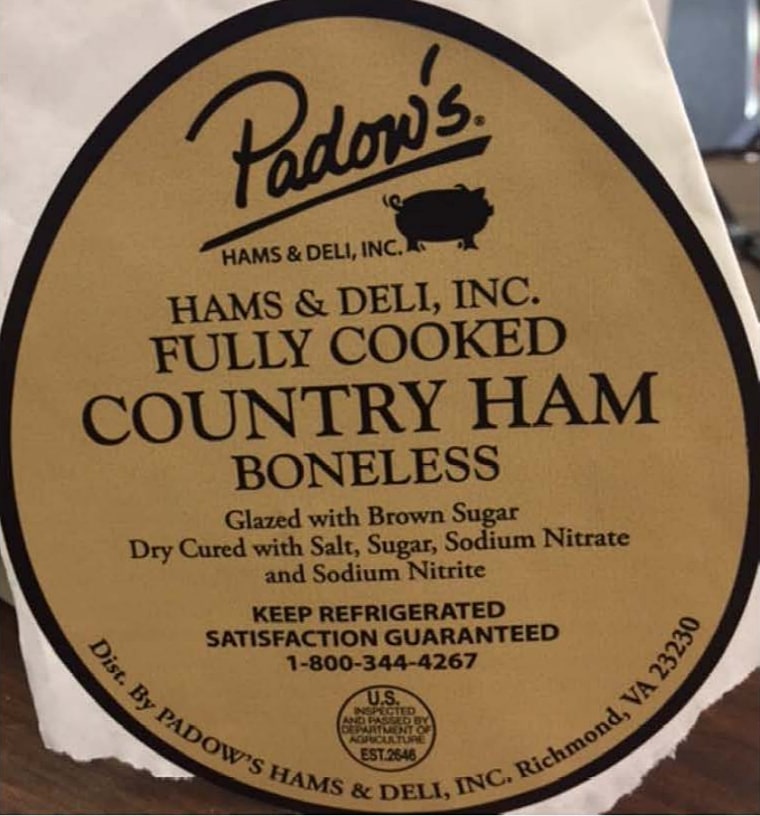One person has died and four hospitalized in an outbreak of listeria linked to cured hams from North Carolina, federal health officials said Thursday.
And in a second outbreak, an Arizona producer recalled 6.5 million pounds of ground beef after 57 people became ill from salmonella.
The ham recall affects 89,000 pounds of ham products made by Johnston County Hams, Inc. in Smithfield, North Carolina.
The ham maker has recalled the hams, which were produced from April 3, 2017 through October 2, 2018, the Centers for Disease Control and Prevention said. Any deli or other shop that sliced or sold the hams should clean their equipment thoroughly.
“Return them to the store for a refund or throw them away. Restaurants and retailers should not serve or sell recalled Johnston County Hams products," the CDC said.
The CDC will not say where the products were sold, but the U.S. Department of Agriculture said they were distributed in Maryland, North Carolina, New York, South Carolina and Virginia. The illnesses that have been reported were in North Carolina and Virginia.
Federal agencies often allow companies to keep confidential details about where products have been sold, even in food recalls. Last month, the Food and Drug Administration said it would start giving out more information about where contaminated food products have been sold.
“When available, the retail distribution list will be posted on the USDA-FSIS website,” the CDC said.
Checks have traced the listeria that made people sick to hams produced by Johnston County Hams as far back as April 2017, the CDC said.
“Return any recalled deli ham to the store for a refund or throw it away,” the CDC advised.
“Even if some ham was eaten and no one got sick, do not eat it. If you do not know if the ham you purchased was recalled, ask the place where you purchased it or throw it away.”
People should also thoroughly clean any place the ham may have touched. “Wash and sanitize drawers or shelves in refrigerators and freezers where recalled ham was stored,’ the CDC said.
“If you develop symptoms of a Listeriainfection after eating recalled deli ham products, contact a healthcare provider and tell them you ate recalled ham. This is especially important if you are pregnant, age 65 or older, or have a weakened immune system.”
Listeria usually only causes mild illness, but it can cause serious sickness in people with weakened immune systems, including the elderly, pregnant women, cancer patients or other patients using immune-suppressing drugs.
It’s a tricky germ to kill because it can live in the cold, said Dr. Johan Bakken, a retired infectious disease specialist and spokesman for the Infectious Diseases Society of America.
“Listeria are organisms that actually thrive in cold environments. That’s why we often have listeria outbreaks associated with products such as ice cream,” Bakken said.
The process used to preserve hams does not kill germs, he added. Cooking or spraying food products with special saline solutions can kill germs, but smoked or cured ham is not usually prepared in this way. And ready-to-eat products can be contaminated after they are prepared, for instance during the packaging process, he said.
According to the company’s website, the hams are salted and dried.
“Our unique flavor is a result of our curing process that is based on the techniques used by America's early colonists. These techniques involved ‘salting’ the hams and then letting the hams ‘cure’ naturally,” it says.
Food processing equipment can stay contaminated for months or years with organisms such as listeria, Bakken said. The CDC agreed.
"It is certainly a possibility that there is some sort of niche or reservoir in the facility that was intermittently contaminating food that was there," the CDC's Matthew Wise told NBC News. "That is something we see pretty commonly in listeria outbreaks."
More cases are likely to turn up in the coming weeks, the CDC said. It can take several weeks for cases of listeria to be reported.
Beef recall, too
Separately, the USDA said JBS Tolleson, Inc of Arizona was recalling 6.5 million pounds of raw beef, including ground beef, because it may be contaminated with salmonella.
So far, 57 people have been reported sick in 16 states, the CDC said.
The products were sold under several labels, including Cedar River Farms, Gourmet Burger, Grass Run Farms Natural Beef, JBS Generic, Showcase and Showcase/Walmart.
The USDA has a full list of affected products online.
The USDA said some people could have contaminated beef in their freezers. Salmonella can survive freezing, said Wise. "If it had been contaminated with salmonella, it could still be contaminated when you thaw it out," Wise said.
“Consumers who have purchased these products are urged not to consume them. These products should be thrown away or returned to the place of purchase,” the USDA said.


